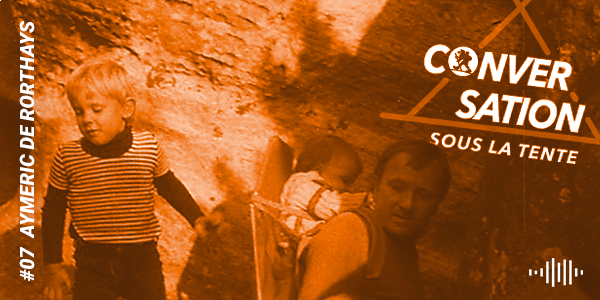Bienvenue dans Conversation sous la Tente, un podcast proposé par Gore Tex et Au Vieux Campeur.
Pour cet épisode, on reçoit sous la tente le directeur général du vieux campeur, Aymeric de Rorthays, qui est aussi le petit fils du fondateur Roger de Rorthays.
Il arrive du QG situé en proche banlieue parisienne pour nous retrouver au magasin camping, 26 rue des écoles, au coeur de l’écosystème parisien composé d’une trentaine de boutiques. Souriant et énergique, ici pas de monsieur, tout le monde l’appelle Aymeric.
Avec lui on parle de l’entreprise familiale, véritable exception française, de sa vision de la nature et de son matériel préféré.
Retrouvez nous sur toutes les plateformes, de Soundcloud à Spotify en passant par les applis Podcast de Apple ou Android :
Apple podcasts : https://podcasts.apple.com/fr/podcast/conversation-sous-la-tente/id1477886617
Soundcloud : https://soundcloud.com/conversationsouslatente
Spotify : https://open.spotify.com/show/5wZkYMnpn9RBV48ccxGXl7
You tube : https://youtube.com/playlist?list=PLXmCqvVGZAVJv1yijz5BcL7ecZGtpgWz-

Ses 3 items fétiche :
– Un sac à dos Tentree
– Une paire de chaussure Lowa Renegade
– Une tente MSR Huba Huba
Aller plus loin :
Veets, la marque de chaussure fabriquée en vendée www.veets.fr
Aouro, la veste de tous les jours d’Aymeric de Rorthays, fabriquée en France, www.aouro.co
Sac à dosTentree, 100% recyclé www.tentree.com
Et bien sur le site www.auvieuxcampeur.fr















History of Online Gambling Development and
Key Milestones
Timeline of Online Gambling Development and Milestones
The transformation of betting activities has taken a remarkable turn with the rise of virtual platforms.
In the late 20th century, the emergence of the internet
paved the way for alternative forms of wagering, shifting traditional experiences
to digital screens. The first major leap occurred in 1994, when Antigua and Barbuda passed legislation to
license online casino operators, marking a pivotal point in the accessibility of these services
worldwide.
From rudimentary websites offering simple card games to
elaborate interfaces mimicking the ambiance of physical
casinos, the transition has been swift and dynamic. The introduction of real-time
gaming in the early 2000s allowed players to
experience a more immersive environment, setting the stage for the
expansion of various formats, including poker
rooms and sports betting. This period also saw the rise of software providers, who played an instrumental role in enhancing
the user experience.
Regulatory frameworks began to take shape, with governments recognizing the need to manage this burgeoning sector.
Countries like the United Kingdom implemented licensing systems aimed at protecting consumers while fostering business growth.
This regulatory evolution not only provided legitimacy but also
cultivated trust among users, crucial for long-term
engagement. As mobile technology advanced, it became apparent that accessibility would
be a key factor in driving participation, leading to the
development of dedicated applications that transformed how players interact with their favorite games.
Evolution of Online Gambling Platforms and Technologies
The shift from traditional establishments to virtual environments transformed how
users engage with betting services. In the late 1990s, the introduction of
the first platforms marked a significant change. These early sites operated on basic HTML and relied heavily on limited payment options,
restricting accessibility for many potential users.
The first platforms gained traction quickly, leveraging the novelty of
the internet. By the early 2000s, advancements such as Flash technology improved user interaction. Subsequently, the incorporation of secure payment gateways
addressed concerns about financial safety, fostering a more significant player
base.
With the advent of mobile devices, the focus shifted once again. The launch of
apps allowed for a seamless experience, permitting users to engage from anywhere.
HTML5 technology was pivotal, providing compatibility across various devices without compromising quality.
This mobile-friendly approach captured a wider audience, including those who preferred convenience over
traditional methods.
Live dealer features emerged next, bridging the gap between physical and online experiences.
High-definition streaming and real-time interaction created a more immersive atmosphere,
mimicking the social elements of brick-and-mortar
venues. This innovation not only attracted more users but also established a new benchmark for engagement.
Blockchain emerged as a game-changing technology.
Its transparency and security reinforced trust among participants.
Smart contracts have begun to facilitate quick payouts and instant verification, reducing operational costs and enhancing the user experience.
Artificial intelligence is now shaping personalisation strategies.
Data analysis allows for tailored recommendations, ensuring
that offerings resonate with individual preferences.
This level of customisation enhances retention rates and
user satisfaction, providing platforms with a competitive edge.
Responsible gaming measures have also evolved in tandem.
Tools such as self-exclusion and deposit limits are becoming standard,
promoting a safer environment. Operators are increasingly integrating these features to demonstrate
commitment to ethical practices, thereby enhancing their credibility.
Future trends suggest further integration of virtual reality environments, promising a
more interactive experience. As technology progresses, the potential for innovation remains
vast, driving the sector toward ever-higher standards of engagement and security.
Regulatory Changes Shaping the Online Gambling Landscape
The regulatory framework surrounding interactive betting
has undergone significant transformations across various jurisdictions.
In the United Kingdom, the 2005 Gambling Act served as a
pivotal point, introducing the UK Gambling Commission to supervise operations and
ensure consumer protection. This legislation set a precedent for transparency and fairness, pushing operators to obtain licenses to
operate legally.
In the United States, the repeal of the Professional and Amateur Sports Protection Act in 2018 allowed individual states
to legalize sports wagering. This shift resulted in a rapid expansion, with New Jersey leading the
charge. State regulators now play a crucial role in determining the
operational environment for betting enterprises within their borders, creating
a patchwork of laws that varies widely from state to
state.
European territories, such as Malta and Gibraltar,
have become popular licensing hubs due to favorable taxation and regulatory conditions.
Malta’s Gaming Authority, established in 2001, has implemented stringent measures to ensure player safety while promoting responsible gaming.
These regulations have attracted numerous companies seeking to operate in a regulated and stable environment.
The introduction of remote gaming regulations has also transformed the
sector. Many countries have established rules that require operators to use secure technology and
protect personal data. GDPR compliance in Europe has pushed platforms to adapt their data handling practices, ensuring
that player information is safeguarded against breaches.
Emerging markets, particularly in Latin America and Asia, are beginning
to embrace regulatory frameworks. Countries like Colombia have enacted laws favoring local
operators and ensuring tax revenue while protecting players.
As these regions develop their own regulations, they present
new opportunities for growth and innovation.
As laws continue to evolve, adapting to technological advancements and societal expectations is critical for operators.
Compliance teams must stay informed about local regulations and trends to navigate the complexities of the terrain effectively.
Engaging with stakeholders, including consumers
and public entities, fosters a collaborative approach to shaping
policy that meets the needs of all parties involved.
Review my page – aviator
plinko hra